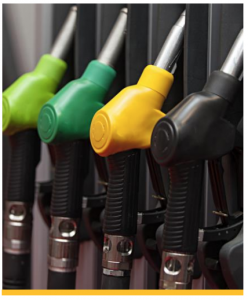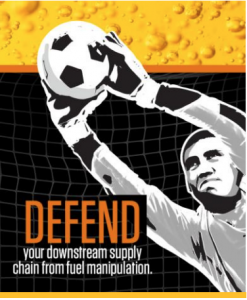By Chad Crouch, Vice President, Authentix.
Fuel manipulation can have a major impact on your revenue and brand reputation (and you might not even know it’s occurring).
Fuel integrity is a key component of brand protection for oil and gas companies distributing fuel to its consumers. Unfortunately, fuel manipulation is a widespread problem that can severely undermine your brand. How big is the fuel manipulation problem? Ernst and Young estimates that stolen, adulterated and defrauded fuel contributes to $133 billion of losses each year.
Fuel manipulation can be notoriously difficult to detect in the supply chain, but when discovered, the magnitude of the problem can be enormous. In a U.S. court case, for example, a petroleum wholesaler was found guilty of diluting medium and premium grades of gasoline with regular unleaded fuel. The company also represented and sold non-branded, low-grade fuels as branded fuels. Executives at the wholesaler were found criminally guilty and the firm was fined 30 million USD.
Sometimes fuel manipulation is a criminal act, sometimes it’s accidental. Improper dosing or blending of additives into fuels at terminal and retail sites can be caused by equipment failure, human error, or negligence. When that happens, oil companies lose revenue and suffer brand erosion.
Do you feel confident that your branded fuel that leaves the terminal is the same quality as what reaches the retail site and is ultimately sold to consumers? Without the right tools and technology to detect manipulation, you can’t really be sure.
Brand degradation occurs when customers unknowingly purchase adulterated fuels that result in poor engine performance or mechanical problems with their vehicles or other equipment. This will often trigger complaints (directly or on social media) and can result in negative coverage in the news media. Any type of fuel manipulation, irrespective of whether it occurred knowingly or unknowingly, is an exposure that can result in consumer mistrust of your products and cause irreparable damage to your brand.

Environmental damage can be caused by fuels that have been under-additized, leading to greater vehicle emissions, and consequently, more air pollution due to the mixing of waste products or non-petroleum products with your branded fuel.
Damage fuel claims can be devastating for oil and gas companies. If the damage claim stems from a single station operator, damage to the brand can be quickly localized. However, if the source of the problem is broader in scope (i.e., a large retail chain, a route operator, or fuel distribution terminal), the effects of complaints and damage claims can quickly gain momentum, harming the brand’s reputation and running up significant operating costs.
You must defend your downstream supply chain.
The supply chain for an oil and gas company is becoming increasingly complex. The more complex, decentralized and variable the supply chain, the greater the risk of manipulation. When fuel enters your supply chain, it moves through fuel terminals to wholesalers and retailers that may include franchisees, oil marketing companies, sub-distributors, carriers, open dealers, and independent store owners. Fuel integrity can be compromised at any “link” in this complex supply and distribution chain.
The disparity in price between a differentiated or branded fuel and a lower-grade or non-branded fuel creates an enticing arbitrage opportunity that can result in fraud and illicit gain. For example, unethical operators can illegally dilute a high-price and high-value product with low-cost and lower-grade fuel and pocket the difference. Diluting premium fuels with regular fuels of the same brand can place an additional 10% of income in a perpetrator’s wallet, more if the diluent is an unbranded fuel. If the diluent is not fuel but is instead water or a waste product (i.e., used motor oil), the return could be as much as 100 percent.
You can be sure of fuel integrity with an advanced fuel authentication solution.
An effective fuel authentication solution illuminates the supply chain to identify the opportunistic, fraudulent or accidental manipulation of differentiated and branded fuels. This can be accomplished by incorporating covert chemical markers into refined petroleum products and utilizing analyzers to validate the authenticity.
Fuel marking is an extremely effective solution to enable your organization to defend against manipulation and achieve revenue targets for your branded and differentiated fuels. By understanding where you have been compromised in the supply chain, your organization can then take corrective action to prevent future manipulation and ensure your fuel’s authenticity in the long term.
Another benefit of a well-designed fuel authentication solution is its powerful deterrent effect. When fuel retailers know their stations are being randomly audited, and they know the range of penalties that other operators have incurred for diluting fuel, they tend to be much more resistant to temptation and the level of contract compliance increases dramatically. After all, no one wants to be the next case study for the effectiveness of the fuel authentication solution.

You can be your company’s brand protector.
If your company was a football/soccer team, you’d be the goalkeeper. Your team depends on you to protect what matters most. Every day you are protecting your downstream supply chain from unpredictable threats that range from terminal issues to intentional acts of fuel manipulation. If even one ball gets past you into the net, it can have devastating consequences—lost revenue, harm to the environment, and damage to your brand reputation.
Your customers trust you to deliver a quality product, and it is your job to deliver on that promise. With the right fuel authentication solution, you can confidently assure the integrity of your supply chain—from the terminal to the pump.
Chad Crouch is Vice President at Authentix, the authority in authentication solutions. Authentix helps you thrive in supply and distribution chain complexity by providing advanced authentication solutions for governments, central banks and commercial products. These solutions ensure that local economies grow, banknote security remains intact, and commercial products have robust market opportunities. Our partnership approach and proven sector expertise inspires proactive innovation, helping you mitigate risks to promote revenue growth and gain competitive advantage.
